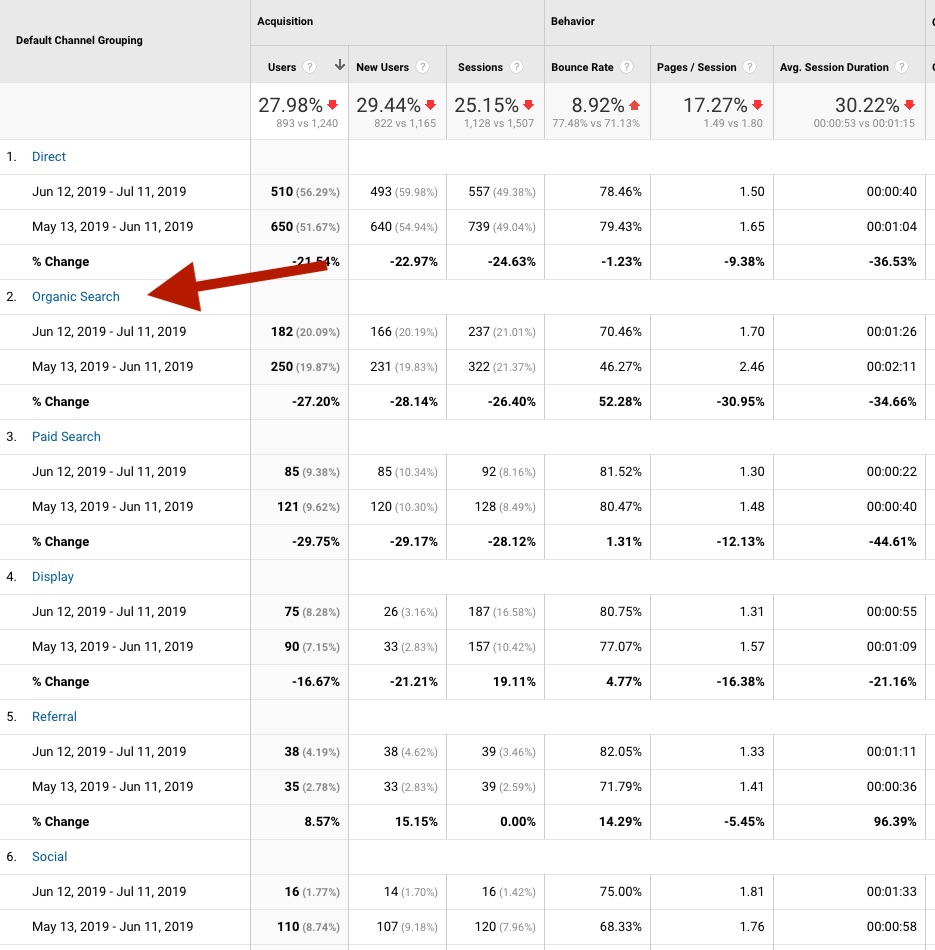
Improve Your Website's SEO
SEO maintenance is one of a number of important items to keep your website healthy. Organic visitors are your very likely your strongest leads and converters. So how do you maintain and improve your site's SEO? It's never a one and done situation. It takes on-going work.
SEO Performance Tracking
The first step is to assess how well your website is doing. Google Analytics is a good place to start. Run a comapative to the previous year or period to see how you're trending. The following is not what you want to see.

You can also monitor your SEO using keyword tracking which comes standard with many website monitoring tools such as Uptrends, Woorank, SEMrush and many others. Or there are SEO-specific monitoring tools such as Advanced Web Ranking. And in each case, you need to first identify which keywords you want to track your performance against.
Keyword Research
Here you start by identifying your target audiences and applying empathy to undertsand which terms they are likely use when they sit down and open Google. Often these are not the same terms you use internally. There are again, a host of tools to help you find these. Google Adword's keyword tools are generally a good place to start.
How to Improve You Search Engine Optimization
With the results of your SEO performance in hand, you can identify which terms to work on. There are over 200 ranking factors that Google uses to determine search ranking. These fall into two primary categories: on-page and off-page. The work you can do generally falls primarily in the on-page category.
Top On-Page SEO Elements
Page Titles
Every page has a <title> attribute which is generally revealed in the tab of the browser, and the search engine results page. This is a very strong signal to Google. Every page should have a unique title that speaks to both search engines but without sacrificing its utility as a marketing hook in the search engine results listing. Each page should have a unique theme where the title and content all focus on the same terms. Since you're limited to less than 70 characters, you must be very strategic about how you apply those keywords.
Page Content
The quality and relevancy of the page content is very important. Google's interpretive skills continue to improve, such that Google can interpret meaning. It can also identify bad grammar, and is of course sensitive to keyword stuffing, so you need to make sure the content reads well and isn't overy concentrated with the same terms repeated over and over.
Headlines - Your H1, H2, H3 headlines are also strong indicators for Google. Write these carefully, and be sure they are used sequentially for ADA compliance as well.
Image Alt Tags - Every image should have a descriptive alt tag. These are generally not seen on the front side of the page, however boht Google and screen readers that people with disabilities use, so they're important... if not essential for ADA compliance.
Fresh Content - Blogs - Blogs are an excellent tool for SEO and social marketing.
URL
The URL for the page is also a factor. Here you want to align the url with the page title tag. The URL for this page is https://www.propellermediaworks.com/blog/how-to-improve-website-seo, which reinforces the page title: How to Improving Your Website's SEO.
Site Speed
Site speed is especially important for Mobile SEO. Its not technically a known factor for desktop, but it is for mobile. If you're looking to attract mobile users, you'll want to analyze your site's speed using a tool such as Pingdom.
External SEO Elements - In-bound Links
More than any other external factor, the number and quality/authority of websites that link back to your website is a very strong indicator. Every website has an authority rank, and the more sites with strong authority linked to your website, the better. There are many SEO specialists that just focus on this. Its very laborious however, and takes patience to cajole other website managers to link to your site.
SEO Maintenance
While all new content should be optimized as its produced, its a very good idea to be continuously monitoring and optimizing. Realistically, many website managers may not have the resources to be constantly doing this. Therefore, you may wish to outsource to an SEO consultant who can step in periodically to optimize, and to guide your content creators to ensure they write better and better SEO rich content.